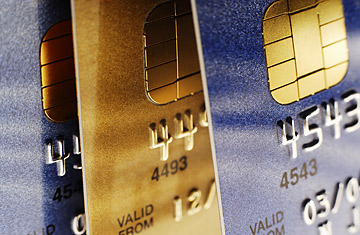
Germans standing in line to pay for groceries at supermarkets this week could be in for a nasty — and embarrassing — surprise. Many of their bank cards will be rejected at the register, but not because there isn't enough money in their accounts. The problem is with a faulty microchip in the cards that can't recognize the year 2010.
Up to 30 million debit and credit cards — around a quarter of all those in circulation in Germany — have been rendered unreadable by the software bug, causing chaos across the country. The situation harks back to the fears over the so-called millennium bug, which many experts thought would cause computer systems around the world to crash when the year switched over from 1999 to 2000. The difference: the millennium bug turned out to be a false alarm. In Germany, the Year 2010 bug has left millions of people fuming at the ATM.
Customers of German savings banks, which are public institutions run by local councils, have been hit the hardest. More than 20 million of these banks' cards were not working when the glitch cropped up on New Year's Day. About 2.5 million cards issued by private banks such as Commerzbank and Postbank were also affected.
German banks have been working round the clock for the past week to try to fix the problem, which involves reconfiguring tens of thousands of cash machines and payment terminals in German stores and supermarkets, as well as those in countries visited by vacationing Germans, to be able to read the faulty chips. Officials said that replacing all of the cards would simply be too costly and time-consuming.
"This is unprecedented because the software bug hit millions of cards," says Michaela Roth, a spokeswoman for the Central Credit Committee (ZKA), a group that represents five public and private banking associations. "We're looking at different options right now and we're confident we can repair the software on the chips."
Over the past few days, bank officials say that most cash machines in the country have been reconfigured and are now reading the cards again. But they say that most payment terminals won't be fixed until at least Monday, which has led some crafty consumers to come up with their own solution — covering the faulty chips on their bank cards with tape so tellers can process payments through the magnetic strip instead. But consumer groups point out that magnetic strips are not as secure as chips, and they've urged the banks to solve the problem as quickly as possible.
The glitch comes as a heavy blow to retailers feeling the pinch after last year's recession — and the gloomy holiday shopping period when sales were largely stagnant. According to HDE, the German retailers' association, at least a fifth of all payment terminals in German stores could not read the faulty cards after Jan. 1. Furious over the loss of sales that resulted, retailers have lashed out at the banks for failing to spot the problem earlier. "We have angry customers and lost revenues and it's simply not our fault," Stefan Genth, the head of HDE, told the German daily Bild. Genth says retailers already have to foot an annual bill of more than $150 million in charges to banks when credit and debit cards don't work in store machines. This new problem will only add to their losses.
"Germany is a high-tech country and it's incredible this software bug could have happened here," Manfred Westphal, head of the financial-services department of the German Consumers' Association, tells TIME. "It's a lousy mistake — obviously the banks didn't test the software properly beforehand." Consumer groups say the banks have only given out piecemeal information to customers who are confused about which cards they can use in cash machines. German Consumer Minister Ilse Aigner has also criticized the banks' handling of the situation and said that consumers shouldn't be held liable for any bank charges they incur.
Bank officials, however, are deflecting the blame, saying that the chipmaker Gemalto is the one responsible for the glitch. The company, which is a major supplier to German banks, said in a statement on its website that it is working with the banks to find a solution that would avoid replacing all the cards, which could cost up to $430 million. "We are fully focused on minimizing the inconvenience for the cardholders," said Olivier Piou, the head of Gemalto. "We will of course meet our contractual obligations, and continue to support our clients."
Until the banks fix the problem, Germans will have no choice but to be patient. Or they could always pay for their goods the old-fashioned way — by cash.
